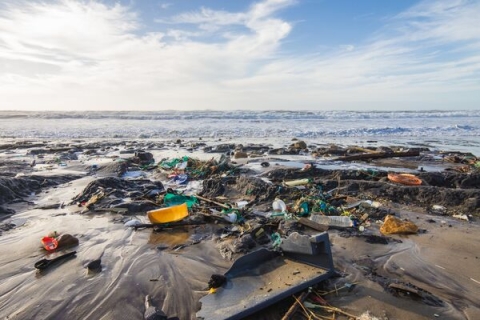

A Research Futures webinar with Dr Keiron Roberts and Professor Steve Fletcher
4 min read
Hosted by Dr Keiron Roberts and Professor Steve Fletcher
The ocean is the ultimate reservoir for plastic litter. From poorly managed waste to microplastic fibres from clothes concentrating on the seafloor, an estimated 8 million tonnes of plastic enter the ocean each year. With this number set to double over the next ten years if substantial changes are not put in place, we need to take immediate action.
Through the 'Osaka Blue Vision', the Government of Japan through its G20 presidency has spearheaded the G20's mission to reverse the upward trend in plastics entering the ocean, with the target to reduce plastic entering the ocean to 2019 levels by 2050.
The University of Portsmouth has been working with the UN Environment Programme (UNEP), the UN International Resource Panel, and Government of Japan to determine policy options to bring this vision to reality. Working with a consortium of international experts from industry, civil society, governments, and intergovernmental organisations, we have produced a series of actions and recommendations that the G20 can implement to meet and exceed this goal.
With the impacts of COVID19 potentially changing global plastic consumption and production patterns for the better, our recommendations include actions to support the G20 and the plastics industry to “build back better” in a new normal (post) COVID19 world.
In this webinar, Dr Keiron Roberts and Professor Steve Fletcher will outline the main findings of our work and highlight the challenges and opportunities of conducting research in collaboration with the G20, particularly in light of COVID19.
We are actively working to ensure that all our web content meets the W3C Web Content Accessibility Guidelines (WCAG) 2.1 AA standard. The YouTube video has been removed as it does not meet accessibility requirements. If you’d like to learn more about our commitment to accessibility for all, please read our accessibility statement.
